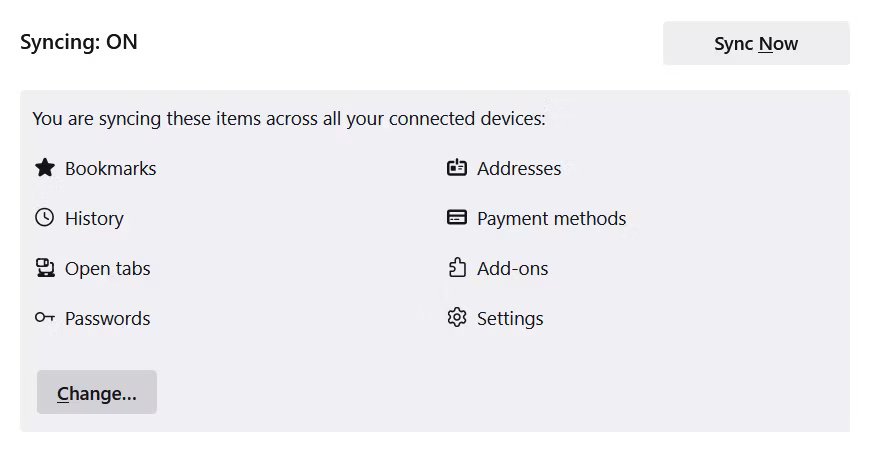4 security issues when syncing browsers
1. Your data will sync with stolen devices and hacked sessions

The biggest problem with browser sync is also its primary use: It shares your saved tabs, bookmarks, browsing history, passwords, and even payment information with anyone. have access to the browser account.
If hackers access your account, you'll lose more than just your email. Accessing your passwords usually only requires entering your browser account password, and hackers can use your payment information if they guess it or get the CVV from your card.
Normally, unauthorized login attempts are detected and prevented, but things like session cookie hijacking can allow hackers to bypass these barriers. If you want to use browser sync, you should avoid saving anything in your browser that you don't want to share.
2. Browser synchronization reduces the privacy of your activities

Another problem with browser sync is that it reduces the privacy of web browsing. When you don't sync your browsing history and other information, that information is typically stored as a local file cache. A profile of your web activity may exist with your ISP and others.
Browser sync works because it takes that locally stored information, puts it in the cloud, and shares it between your devices. So not only is that information at risk if hackers access your device - they can also access it when the data is stored remotely.
Some browsers mitigate this problem by encrypting your data locally before storing it in the cloud. Firefox does this by default for all browser sync users, while Chrome allows you to enable this feature by setting a password.
3. Work and personal boundaries are blurred when synchronizing

While blurring professional and personal boundaries isn't necessarily a security issue, it can pose a serious risk to your professional reputation. Browser sync can add unwanted bookmarks, history, and search suggestions to your work device without your knowledge.
Before syncing your personal device with your work device, you should consider what data will be synced and whether you want to sync that data. You can choose to only sync passwords in some browsers, which can be a comfortable middle ground solution.
If not, you should consider turning off sync on your work device or connecting to a separate work browser account.
4. Browser sync can spread malicious extensions

Last but not least, one of the worst risks of browser syncing is that it can spread viruses on your devices by syncing malicious extensions. These extensions are so popular that the Chrome Web Store has to regularly remove them.
If you accidentally download a malicious browser extension to a device synced with your work device, the extension will install on all of your work devices. It probably won't be worse than adware, but serious extension-based hacks have happened before.
You can avoid most malicious browser extensions by choosing them carefully. Old, popular extensions are better than new, less-reviewed extensions, and extensions from official stores are often safer than extensions that require sideloading.
In general, there is nothing inherently wrong with browser synchronization. It provides enough convenience to make taking the risk worthwhile. However, if you choose to use browser sync, you should consider the above points and take some steps to use this feature with less risk.
You should read it
- How to sync Chrome browser bookmarks on computer with mobile phone?
- Instructions for syncing Chrome data on multiple devices
- How to use Musical.ly - extreme lip sync application
- Top 5 lip sync apps on the best phone
- All you need to know about Nvidia's G-Sync technology
- Instructions to automatically synchronize any folder between your computer and Android
 How to fix Chrome's 'Insecure Download Blocked' warning
How to fix Chrome's 'Insecure Download Blocked' warning What is Anti-Ghosting? Why is it necessary on a gaming keyboard?
What is Anti-Ghosting? Why is it necessary on a gaming keyboard? Is Epic Games Store worth installing?
Is Epic Games Store worth installing? Panorama mode on smartphones can create optical illusions
Panorama mode on smartphones can create optical illusions This hidden feature of Google Docs makes Find & Replace much more powerful
This hidden feature of Google Docs makes Find & Replace much more powerful Instructions for creating animated GIFs in PowerPoint
Instructions for creating animated GIFs in PowerPoint